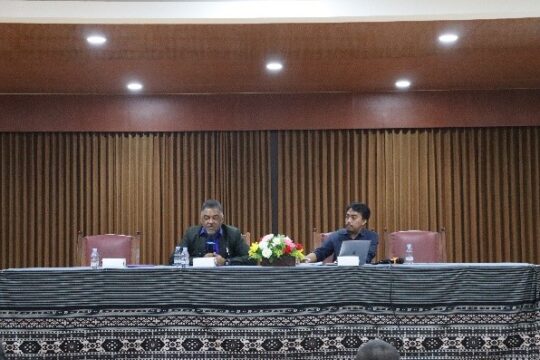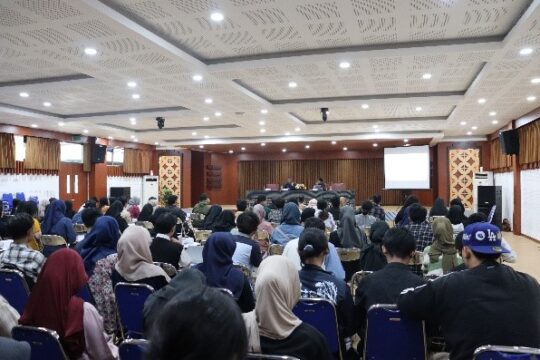“Thank you for coming. You are the most important people in this room. But you have a task. You will all listen to me carefully while I talk for a while. You have to think of good questions! I want to hear your questions when I’m done,” Prof. Fataar said excitedly.
The Faculty of Cultural Studies (FCS) at Universitas Brawijaya (UB) invited Prof. Aslam Fataar from Stellenbosch University, South Africa, as a guest speaker for a lecture themed “Language and Culture in the South African Context.”
The guest lecture began with an introduction of the guest lecturer, delivered by Muhammad Rozin, M.A., a lecturer in the English Literature Study Program, who also served as the moderator. Prof. Aslam Fataar is a distinguished professor in the Department of Education Policy Studies at Stellenbosch University. Specializing in the sociology of education and education policy, he has authored more than 200 publications in the field.
The lecture, attended by students of the English Literature Study Program, was held in the Hall of Building B, FCS UB, on Wednesday (5/15/24).
Prof. Fataar opened his lecture by showing a picture of the university where he teaches, a place from which he was banned from studying decades earlier due to apartheid politics. He explained how colonial powers oppressed indigenous people through education and language.
He also recounted the history of language among the Muslim community of Cape Town, South Africa, his homeland. Many students were fascinated to learn that, during a certain period, Cape Town’s Muslim community used Malay.
“The community I come from, our mother tongue is Dutch Afrikaans. But before we developed that as our mother tongue, the Cape-Indonesian-Malaysian Muslim community used Malay for about half a century,” he said.
He emphasized that those in power often make decisions about language to perpetuate their dominance. The first thing colonizers did was to declare which language would be used in society, including in education. This decision affected all other languages in society, leading to two possible outcomes: the extinction of some languages or their adaptation to the new situation.
“Even if you are linguistically dominated by any structure in society, be it colonial or state government, oppressed and disadvantaged communities are not passive. They adapt,” Prof. Fataar emphasized.
He also discussed two South African Muslim figures who came from Indonesia, Sheikh Yusuf of Makassar and Sheikh Abdullah bin Qadhi Abdussalam of Tidore, better known in South Africa as Tuan Guru. Both were prominent scholars in Indonesia exiled to South Africa during the Dutch colonial period.
“Sheikh Yusuf built a Muslim community in an area also called Makassar in Cape Town. Tuan Guru established the first mosque and madrasa on Robben Island, Cape Town. Because they were devout Muslims with strong cultural roots, they developed a culture in their new community. We are the inheritors of that culture,” said Prof. Fataar.
One of the cultural legacies of Tuan Guru is the Muslim-Afrikaans language, which was developed and written in the Jawi script at the time.
After Prof. Fataar’s lecture, it was time for questions from the students. One interesting question came from Joseph Erandi.
“Earlier you explained how colonialism and apartheid politics caused language shifts. You have given examples of how your ancestors used the local indigenous language and you use Dutch Afrikaans. Based on our knowledge as linguistics students, we recognize this phenomenon as a ‘language shift’. There will be ‘language loss’ and ‘language death’ if it happens continuously. My question is, what can we do as students and researchers in higher education to maintain and preserve languages that are almost extinct?” he asked.
Prof. Fataar answered by giving examples of how his university is trying to preserve endangered languages.
“Good question! What we are trying to do for Indonesian, Muslim Afrikaans, and some indigenous languages in my area is to conduct research projects to develop the languages. To develop a language, you need to visit the archives, go to the people who still use the language, recall the language, and build a theoretical foundation for its structure. These are the kinds of things linguists like you can do. If there is an academic basis for a language on the verge of extinction, you can teach it,” he replied.
Another intriguing question was raised by Akhida Cahya regarding the significance of culture on language.
“In linguistics class, we also learn about the cultural emphasis on language. How the vocabulary in a language implies what is important to that community. For example, we have four words for rice in various forms. This indicates how close rice is to our culture. You said that the Dutch banned the use of Muslim Afrikaans. Has this also affected the cultural practices of the local community? What were the implications of banning the language on the culture at the time?” she asked.
“Something happened when you weren’t allowed to use your linguistic variation in the classroom or community. But that doesn’t mean people stopped using it. They adapted and used it in other places, in private if it was banned in public. Rice is a very good example; your language has several words for ‘rice’ signifying its cultural importance,” explained Prof. Fataar.
“Language is associated with practice. When a language is no longer needed, it dies. As long as cultural practices continue, language will still be used, even if forbidden, because there is a need for it. Culture will continue to be practised even if the use of language in public is prohibited. A very good question!” he concluded.
The guest lecture ended with a group photo session and the presentation of souvenirs from FCS UB. [trans.acl/ed.al/vidya/PR FCS]


